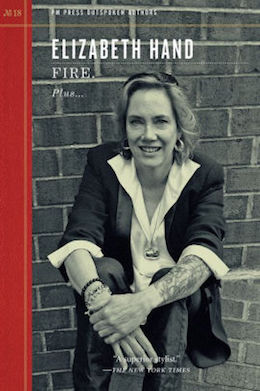Some authors have a very distinct brand; their individual works, whether major or minor, are all of a type. If they publish enough, readers tend to make an adjective of their name—so “Ballardian” evokes crashed cars, empty swimming pools, and accelerating entropy, all clinically described, while “Vancean” writers evince a fondness for abstruse vocabulary, ponderous elegance, and gloriously improbable societies. An “Asimovian” story might sacrifice prose and characterization to the rational working out of a Big Idea, while a “Phildickian” tale proceeds by way of shattered realities and paranoid revelations.
Other writers, though, seem almost to begin anew with each new book; so restless are their subjects, styles, and preoccupations that readers never feel entirely settled or comfortable with them. Elizabeth Hand is one such author. She is far too mutable a writer for “Handian” to ever become science fiction shorthand.
The list of awards on Hand’s CV testifies to her range: it includes the Shirley Jackson Award, given for “psychological suspense, horror, and the dark fantastic;” the Nebula, awarded for science fiction; and the World Fantasy Award, presented, of course, for fantasy. She’s published a YA novel about magic, the theater, and incest; a ghost story about folk singers in an Old Dark House; three mysteries about Cass Neary, aging punk photographer and occasional detective; a fantasy trilogy; dozens of short stories; a handful of tie-ins; and several standalone titles. Not only can Hand write with equal authority on the punks and the Pre-Raphaelites, she convinces her skeptical readers that these two wildly divergent movements share some affinities.
Despite the radical differences in form, setting, genre, and intended audience, a devoted Hand reader will gradually begin to uncover unifying themes. Fire., the new Hand collection from PM Press, provides an opportunity to develop a better understanding of her career.
As Hand discloses in “How I Became a Writer,” much of her work is implicitly biographical. The eccentrically grand old houses that we see in Illyria or Wyldling Hall, with their knickknacks and ephemera and their tinctures of dread, mystery, and coziness, derive from her grandfather’s rambling Hudson Valley estate. Some of Cass Neary’s early life—skipping class to enjoy culture and neglecting studies to experience bohemia—parallel the author’s own life. In the essay’s most disturbing passage, Hand also describes a direct experience of true evil; her characters struggle with the desolation occasioned by similar ruptures. Although most of her first Cass Neary novel, Generation Loss, takes place on an island off Maine, one of its most memorable scenes takes place in New York, where Cass, ensconced in a downtown apartment, watches an era end on the morning of September 11, 2001. Both of the short stories in Fire. feature lives devastated in a second; in Hand’s fiction, no world and no individual life is proof against wanton and unwarranted destruction. Few things are more permanent than fragility.
Fire. concludes with two biographical essays on two of science fiction’s tragic heroes. Hand is a past winner of the Tiptree Award, named in honor of Alice Sheldon’s pseudonym James Tiptree, Jr. Sheldon, Hand argues, might have been happy had she been born several decades later in a world more considerate of childhood trauma and more accepting of unconventional gender identities. Instead, Sheldon led a life that mixed adventure—childhood expeditions in Africa, postwar intelligence work—with trauma in almost equal measure. In Hand’s telling, the sad end of the story, a murder-suicide, seems almost inevitable: that Alice Sheldon ended her own life doesn’t shock so much as the fact that she endured it so long and so well. Hand’s subsequent essay, on Tom Disch, once again reminds us of just how funny, provocative, and challenging a writer the SF community lost nearly ten years ago. In both of these essays, Hand evinces an honesty and bluntness akin to her subjects’. Neither author “passed suddenly” or “died unexpectedly”; neither author, I suspect, would want such anodyne obituaries.
The shortest piece in Fire. may well be my favorite. “Kronia” is a slipstream, forking-paths story about all the times a woman and her lover did (not) meet, the children they (did not) have, the mutual friends they did not (or did) share, of places they might have traveled and lives they might have led. It’s dreamlike and hard-edged; like Hand’s fiction in general, “Kronia” is tender without being saccharine and attuned to the past without becoming nostalgic. The narrator of the story lives dozens of possible lives in six pages, and perhaps this multiplicity is what’s truly most characteristic of Elizabeth Hand’s writing. No two fans would ever agree on a Liz Hand reading order, and every reader will have a different favorite of her books. They will, however, agree that Elizabeth Hand is worthy of attention, admiration, and devoted reading.
Matt Keeley reads too much and watches too many movies; he is helped in the former by his day job in the publishing industry. You can find him on Twitter at @mattkeeley.










